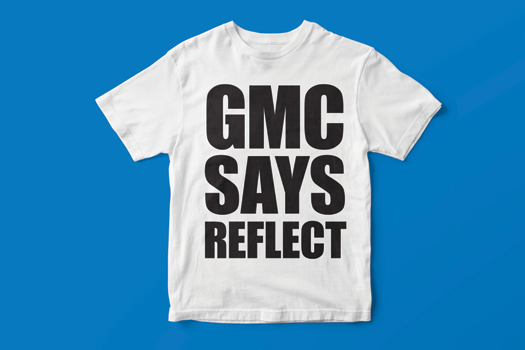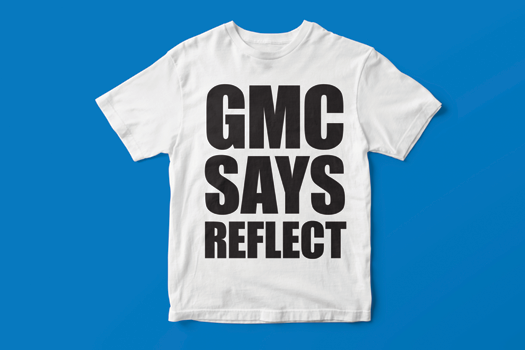
gmc says reflect t shirt 525x350px
The consequences of the Dr Hadiza Bawa-Garba case continue to reverberate. The GMC has now attempted to address one of doctors’ main fears arising from the case – whether their own reflections could later be used against them in court.
In guidance issued last month, the GMC has clarified that courts can continue to ask for reflective documents – something it has campaigned against. It recommends doctors seek legal advice if they receive such a request.
The regulator has also advised that doctors should continue to submit reflective accounts as part of their training and practice, and for revalidation – but leave out ‘full factual details’.
The BMA and RCGP have welcomed the clarification. But other GPs have pointed out it leaves them in a tough position, facing uncertainty over how they can reflect effectively without including factual details.
‘Factual details should not be recorded in appraisal portfolios’
The guidance, published jointly with the Academy of Medical Royal Colleges, the UK Conference of Postgraduate Medical Deans and the Medical Schools Council, says: ‘Factual details should not be recorded in appraisal or learning portfolios.’
It later adds: ‘Following a significant event or a serious incident, factual details should not be recorded in reflective discussions but elsewhere, in accordance with each organisation’s relevant policies.’ It also underlines that reflections are not covered by legal privilege.
The central point of the guidance is that doctors should ‘focus on the learning rather than a full discussion of the case or situation’ in their accounts (see box below). It also says information recorded should be ‘anonymised as far as possible’.
GPs have been divided over whether the new approach of omitting factual details is practical.
RCGP chair Professor Helen Stokes-Lampard says the college welcomes the clarity the guidance provides.
‘Recent events have caused a lot of anxiety among all doctors, and particularly trainees, about how and when to reflect appropriately and effectively – and we hope this guidance goes someway to alleviate that,’ she says.
Focus on learning, rather than blame
Dr Jeeves Wijesurija, a GP trainee and BMA Junior Doctors Committee chair, supports the GMC’s stance on anonymising notes and the need to exclude factual details.
He says: ‘It is imperative that doctors are able to reflect openly and honestly… to deliver safer care.
‘The focus must be on learning, rather than blame, and so clarity that specific factual details are not needed to improve care in the future is welcome.’
Similarly, Dr Chandra Kanneganti, a GP appraiser and BMA GP Committee member, describes the guidance as a step in a ‘positive direction’. He adds that GPs reflecting on a complaint ‘used to write down everything about the complaint… putting all the factual information about [the case], a copy of the complaint letter, striking out the name of the complainant’.
Concern new approach will take more time
But it has not been universally welcomed. GP appraiser Dr Zoe Norris, who is also BMA sessional GP subcommittee lead, says it is unrealistic to ask doctors to exclude factual details.
She says: ‘Trying not to include factual information is almost completely unlearning everything we’ve ever done and people will find that really hard.
‘If they’re going to expect doctors to go through and make sure every single entry is completely anonymised so it couldn’t possibly be linked back, that’s just going to take twice as long as it does now.
‘It still goes against the grain of open and honest reflection. I think people are just going to find it too hard and will therefore withdraw from doing reflections in the same way.’
Dr Bawa-Garba case prompted clarity over court requests
The new guidance stems from concerns over whether reflective accounts might be used against a doctor during court proceedings. These concerns were sparked by the case of Dr Bawa-Garba, the junior doctor convicted of manslaughter by gross negligence after the death of a six-year-old boy in her care.
Following her conviction, the GMC successfully argued Dr Bawa-Garba should be permanently struck off from the medical register – a High Court ruling that was overturned on appeal earlier this year.
Pulse revealed that the junior doctor’s reflections were seen by expert witnesses ahead of her original manslaughter conviction – although her e-portfolio was not submitted as part of the trial evidence.
But confusion persisted over the extent to which reflections could be used against doctors in the lead up to, or during, court proceedings.
In February, the GMC wrote to the House of Commons health select committee to explain that although it would never ask doctors to provide reflective statements when it is investigating a concern, e-portfolios are not covered by legal privilege in UK criminal law.
The letter, penned by GMC chief executive Charlie Massey, said: ‘As a result, these documents might be requested by a court if it is considered that they are relevant to the matters to be determined in the case.’
Calls for legal protection for reflective accounts remain
However, this is one area where the GMC and the profession are in agreement. The Government’s recent review of medical gross negligence manslaughter stopped short of recommending legislation to block court requests for doctors’ written reflections. But both the BMA and the regulator would like to see legal protection given to reflective accounts.
When the GMC’s guidance was published, its director of education and standards, Professor Colin Melville, underlined the point: ‘Reflecting on experiences, both good and bad, is hugely important.
‘The GMC doesn’t ask doctors for reflective notes to investigate concerns; in fact we have called for those notes to be given legal protection.’
Regardless of this point of agreement between the GMC and the BMA, Dr Norris believes the new guidance is unlikely to improve relations between the GMC and the profession, which were damaged by the Bawa-Garba case.
‘I don’t think it’s going to make much difference. It comes back to trust and the profession doesn’t trust the GMC… and I don’t think putting out a document is going to rebuild that trust.’
Key points: GMC’s guidance on reflections
• Full factual details do not need to be recorded in appraisal or learning portfolios
• When keeping a note, the information should be anonymised as far as possible
• The GMC does not ask a doctor to provide their reflective notes when investigating a concern about them but doctors can choose to offer them as evidence of insight into their practice
• Recorded reflections, such as in learning portfolios or for revalidation or continuing professional development purposes, are not covered by legal privilege. This means disclosure of these documents might be requested by a court if they are considered relevant
• If disclosure of confidential patient information is required by law, you should:
a) satisfy yourself that personal information is needed, and the disclosure is required by law
b) only disclose information relevant to the request, and only in the way required by the law
• Where a disclosure request is received from a court, the owner of the learning portfolio or other reflective note should seek advice from their employer, legal adviser, medical defence organisation or professional association
• Tutors, supervisors, appraisers and employers should support time and space for individual and group reflection
• A reflective note does not need to capture full details of an experience. It should capture learning outcomes and future plans
• Reflection should not substitute or override other processes that are necessary to record, escalate or discuss significant events and serious incidents
• The healthcare team should have opportunities to reflect and discuss openly and honestly what has happened when things go wrong
• Reflection is personal and there is no one way to reflect. Having time to reflect on both positive and negative experiences – and being supported to reflect – is important for individual wellbeing and development
Source: GMC, 2018. The reflective practitioner – guidance for doctors and medical students.

















